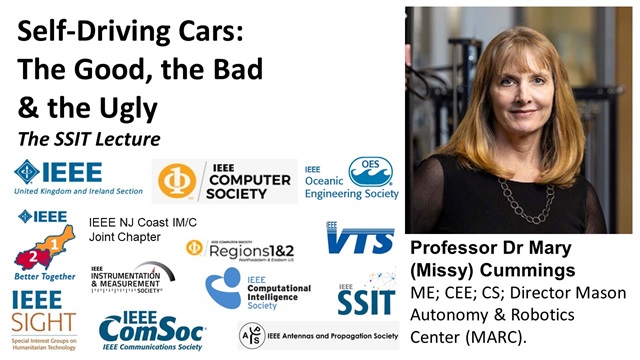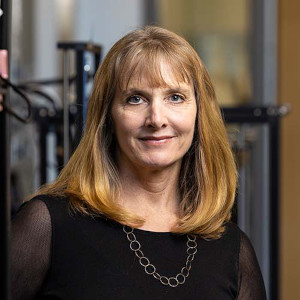IEEE SSIT Lecture: Self-Driving Cars: The Good, the Bad & the Ugly

Prof Mary (Missy) Cummings (Director of the Mason Autonomy and Robotics Center (MARC) at George Mason University, USA) will present "Self-Driving Cars: The Good, the Bad & the Ugly" at 6pm (UTC+1) / 1pm EDT on 30 April '24. Click here to convert to your local time
IEEE UK and Ireland SSIT Chapter and SSIT IST-Africa SIGHT are cooperating with a number of IEEE OUs including: New Jersey Coast Section SIGHT; New Jersey Coast IM/Computer Joint Chapter; IEEE Region 1; IEEE Region 2; Vancouver Section Jt. Chapter,TEM14/PC26/E25/SIT30; North Jersey Section SSIT Chapter; Susquehanna Section Computer Chapter; Southeast Michigan Section Vehicular Technology Chapter; Phoenix Section Computer Chapter; Vancouver Section Jt Transportation Chapter, UK and Ireland Computational Intelligence Chapter; UK and Ireland Computer Society Chapter, UK and Ireland Vehicular Technology Chapter UK and Ireland Oceanic Engineering Chapter, Chicago Section Computer Society Chapter and Vehicular Technology Chapter to organise this SSIT Lecture as a joint Webinar on 30 April '24.
Registration
IEEE and SSIT Members as well as non-IEEE Members are invited to Register and participate.
IEEE Members should include their IEEE Membership Number when registering.
Access to online Meeting
Registered participants will be provided with the link prior to the event.
Guest Lecture Focus
Self-driving cars have been a dream from almost the time the automobile was invented. With the rise of artificial intelligence (AI), this dream has seemingly become reality with driverless commercial operations already taking place in a handful of cities around the world. However, the recent tragic accident involving a pedestrian and a Cruise self-driving car, as well as a number of high-profile Tesla crashes, raise the possibility that such
systems may not actually be as capable as envisioned, and questions have arisen about their safety both nationally and internationally. Given these concerns, it is important to step back and analyze both the actual safety records of these vehicles and just why AI is struggling to operate safely under all conditions in autonomous vehicles.
This lecture will highlight the strengths and weaknesses of AI in self-driving cars, as well as in all safety-critical applications, and lay out a roadmap for safe integration of these technologies on public roadways.
Date and Time
Location
Hosts
Registration
-
 Add Event to Calendar
Add Event to Calendar
Loading virtual attendance info...
Speakers
 Prof Missy Cummings
Prof Missy Cummings
Biography:
Mary (Missy) Cummings is Professor of Mechanical Engineering; Computer and Electrical Engineering; and Computer Science and Director of the Mason Autonomy and Robotics Center (MARC) at George Mason University.
Before joining the GMU faculty, she served as the Senior Safety Advisor to the US National Highway Traffic Safety Administration, and held positions at Duke University and MIT. Prior to her academic career, Missy served as a naval officer and navy fighter pilot, one of the first female fighter pilots in Navy history.
Missy’s research interests focus on the application of artificial intelligence in safety-critical systems, assured autonomy, human-systems engineering, and the ethical and social impacts of technologies. Among other honors and awards, Missy is a Fellow of the American Institute of Aeronautics and Astronautics (AIAA). She serves on several national and international committees including co-chairing the World Economic Forum’s Global Future Council of Autonomous Mobility, and she is a member of the National Academies Committee for AI for Scientific Discovery.
Missy earned a BS Mathematics at the US Naval Academy, an MS in Space Systems Engineering at the Naval Postgraduate School and a PhD in Systems Engineering at the University of Virginia.
Agenda
18:00 (UTC+1) Welcome and Introduction to Guest Speaker
18:05 Lecture
18:45 Questions and Discussions

